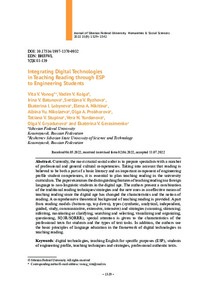Integrating Digital Technologies in Teaching Reading through ESP to Engineering Students
Скачать файл:
URI (для ссылок/цитирований):
https://elib.sfu-kras.ru/handle/2311/148214Автор:
Vonog, Vita V.
Kolga, Vadim V.
Batunova, Irina V.
Ryzhova, Svetlana V.
Lobyneva, Ekaterina I.
Nikitina, Elena A.
Nikolaeva, Albina Yu.
Prokhorova, Olga А.
Stupina, Tatiana V.
Yurdanova, Vera N.
Gryadunova, Olga V.
Gerasimenko, Ekaterina V.
Воног, В. В.
Кольга, В. В.
Батунова, И. В.
Рыжова, С. В.
Лобынева, Е. И.
Никитинa, Е. A.
Николаевa, A. Ю.
Прохорова, О.А,
Ступина, Т. В.
Юрданова, В. Н.
Грядуновa, O. В.
Герасименкo, E. В.
Дата:
2022-09Журнал:
Журнал Сибирского федерального университета. Гуманитарные науки. Journal of Siberian Federal University. Humanities & Social Sciences; 2022 15 (9)Аннотация:
Currently, the most crucial social order is to prepare specialists with a number of professional and general cultural competencies. Taking into account that reading is believed to be both a part of a basic literacy and an important component of engineering profile student competences, it is essential to plan teaching reading in the university curriculum. The paper examines the distinguishing features of teaching reading in a foreign language to non-linguistic students in the digital age. The authors present a combination of the traditional reading techniques/strategies and the new ones as an effective means of teaching reading since the digital age has changed the characteristics and the notion of reading. A comprehensive theoretical background of teaching reading is provided. Apart from reading models (bottom-up, top down), types (synthetic, analytical, independent, guided, study, communicative, extensive, intensive) and strategies (scanning, skimming; inferring, monitoring or clarifying, searching and selecting, visualizing and organizing, questioning, SQ3R/SQRRR), special attention is given to the characteristics of the professional texts for students and the types of text tasks. In addition, the authors use the basic principles of language education in the framework of digital technologies in teaching reading В настоящее время актуальна задача подготовки специалистов,
обладающих профессиональными и общекультурными компетенциями. Учитывая,
что чтение является базовым навыком функциональной грамотности, а также
важным компонентом формируемых компетенций у студентов инженерных
направлений, подчеркивается необходимость тщательного планирования обучения
чтению в вузе. В статье рассмотрены особенности обучения чтению на иностранном
языке студентов нелингвистических специальностей в эпоху цифровых
технологий. Авторы представляют совокупность современных и традиционных
методов/стратегий чтения в качестве эффективного средства обучения, следуя
изменениям в его характеристиках и понятиях в эпоху цифровизации. Дана общая
теоретическая основа обучения чтению. Особое внимание уделяется как моделям
(снизу вверх, сверху вниз), типам (синтетическое, аналитическое, независимое,
управляемое, учебное, коммуникативное, ознакомительное, изучающее),
стратегиям (сканирование, беглый просмотр, вывод, мониторинг или уточнение,
поиск и отбор, визуализация и организация, чтение с вопросами, SQ3R /SQRRR
(Оценить – Задать вопросы – Прочитать – Запомнить – Подвести итоги) чтения, так
и специфике текстов профессиональной направленности, типам текстовых заданий.
Кроме того, авторы используют основные принципы языкового образования
в рамках внедрения цифровых технологий обучения чтению
Коллекции:
Метаданные:
Показать полную информациюСвязанные материалы
Показаны похожие ресурсы по названию, автору или тематике.
-
Specificity of English-Language Teaching for Senior Learners within the Lifelong Learning Concept
Savina, Tatiana V.; Савина, Т.В. (Сибирский федеральный университет. Siberian Federal University, 2015-11)The concept of lifelong learning is believed to involve participants of all ages. In Russia, elderly people (senior adults) are mostly interested in less educationally focused activity, but rather personal development ... -
Innovative Methods in Teaching English to Adults
Kaplina, Svetlana E.; Каплина, С.Е. (Сибирский федеральный университет. Siberian Federal University, 2015-11)The article is devoted to description of innovative methods to adults. Innovative methods and technologies of teaching today are gaining increasing recognition and new opportunities associated with the establishment of ... -
Training Platform: The Network of Best Language Teaching Practices Sharing
Tareva, Elena G.; Тарева, Е.Г. (Сибирский федеральный университет. Siberian Federal University, 2015-11)The article represents an innovative model of accumulation and promotion of best practices of foreign language teaching in the system of lifelong learning. It gives the idea about the nature, status, and features of ... -
Перевод как средство обучения межкультурной коммуникации
Анненкова, А.В.; Annenkova, Arina V. (Сибирский федеральный университет. Siberian Federal University., 2012-06)Translation process is a complicated phenomenon, which involves human cognitive sphere and intercultural issues and, thus, requires interdisciplinary studies. Speculating about translation from methodological perspective ... -
The Use of Sign and Symbolic Visual Aids in Biology Teaching under the Conditions of Schools Shift to the Federal State Standards of the Second Generation
Smirnova, Nelya Z.; Zorkov, Ivan A.; Смирнова, Н.З.; Зорков, И.А. (Сибирский федеральный университет. Siberian Federal University., 2013-09)Didactic peculiarities of sign and symbolic aids are reviewed in the article; some of their aspects applied to biology teaching are analyzed, basic principles of sign and symbolic aids projecting under the conditions of ...

